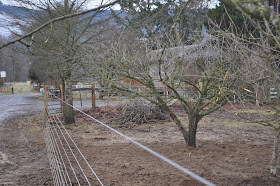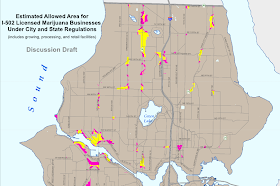Update: The last part of this post is how to raise $600k for your farm
Jeff Richardson wrote an entry about
types of farms on his blog that I thought was interesting, and it reminded me of a conversation I had , which I'll relate here.
I use medium duty trucks for my farm; because they're cheap, sufficiently large to do useful work, and I don't have to worry much about them getting banged up as I buy them used and sell them even more used.
So instead of buying one $40,000 pickup truck, I buy 3 or 4 pickups that cost $5k each, and if any of them require any major repairs they either get sold broken or fixed on a relaxed basis. If you've got a couple of trucks around, one out of commission isn't any big deal.
I get these trucks from craigslist, watching for particular makes and models, or from the local auction where the city and county governments sell their trucks.
So I saw a truck on craigslist that fit my bill, but it was a little over what I wanted to pay, but I figured I'd take a look at it, and met the fellow in the parking lot of a supermarket and looked at his truck and talked a bit about farming in general. Did I say he was a farmer? Well, he wasn't, but was soon going to be; he wanted to sell the truck because he had sold his horse and didn't need the truck to move the horse, so was selling it.
"What brought you here", says I. "Well, " he says "I was working on a ranch in Wyoming. it was a pretty big place; about 96,000 acres, and one day I was riding back to the bunkhouse with the owner, and I asked him how I could start farming, and he said something that really hit home for me."
"what was that?"
"He said 'you'll never get here working for me'. He told me that I needed to go get a job and earn some money and then come and ranch; that working on the ranch would never get me to owning one. So that's what I did. I went back to school and got a degree, and I'm just about done with working here. I've been here six years, and heading back to Wyoming with the money I've saved to buy a ranch. "
"So you moved here with the goal of earning a nest egg to buy a ranch back there?"
"yep"
I think that this is one of the clearest answers I've got to "how do I start a farm" or "where do I get the capital to buy a farm" that I've run across. and this fellow was well along on his path to achieving this goal. I like this answer so much better than "hope a genie gives you three wishes, or that you win the lottery, or that someone will just give you land", which is actually pretty common. Nothing good comes easy. Nothing worth having can be had without a bit of suffering.
This 6 year stretch in Seattle was his chore, his price, for his ranch. We all have chores we need to do. He set a goal and worked over the course of years to achieve that goal.
There's a lot of folks who really, really want farms to be something that are self-funding. They want to make a farm that produces enough income to fund itself, and honestly, I don't think that I have ever seen that happen. Maybe you know of a farm that did do that. A much more common story is what this fellow is doing; you earn the money with your city job and apply that capital to your country job.
I wrote an entry in October of 2012 about this very same issue, called
"The myth of young farmers", and if you're interested in this topic, take a look at that entry. I wrote about my conversation with Irwin.
Take home lesson:
If you want to farm, a plan that involves you, and your effort, is much better than a plan that depends on anyone, or anything, else. There ain't no such thing as a free lunch.
If you are serious about your goal, there may be a period, measured in years or decades, before you can realize it. That is normal, to be expected, and I haven't seen anyone avoid it.
Sustained effort over time takes discipline and the willingness to stand back up after you get knocked down, with the full knowledge that you may go down again. And again. And again.
Don't look at what other people have without realizing that when you look at their results, you need to consider their history, too. Sure, that inherited 200 acres looks good. But someone, at some point in the past, made the sacrifice to buy that land, and the sustained effort. Good land has never been cheap at any time, but it sure does look cheap 50 years later. grandpa suffered for it if the heirs did not. But suffering was endured.
And no one is 'entitled' to farm. there's no farm fairy out there to wave the wand. You are your own farm fairy. Want it? Work for it.
Followup: How to raise $600k for your farm with a minimum wage job
What I'm suggesting here is to make money somewhere else and then farm when you've got the capital in hand to be able to afford it. Most people try to earn the money for their farm by farming. That's a nice idea, a farm that is profitable enough that it allows the farm to expand -- but there are more sure ways to get to where you want to go. What I'm suggesting is an off-farm job combined with living way under your means to save money for a farm. How much money would you say would be enough for you to buy and own outright the farm you'd like to have? $200K? $400k? How much capital would you like to have to start a farm? Another $100k? 200k? So lets say your farming number is $600k, 400k for the farm, 200k for working capital. If you saved $500 a month starting at age 30, at age 61 you'd have $635k * If you saved $750 a month you'd have $641k* at age 56. $500 a month in take-home pay is a minimum wage job for 15 hours a week. $750 a month is a minimum wage job for 23 hours a week. Not everyone will work a part time job for 25 years to achieve their goal. Not everyone will become a farmer. And the other thing is, if you had $600k, would you be a farmer or would you choose another direction? For those folks who have made money elsewhere and gotten into farming, the answer is no. They choose to farm despite having other options. I've deliberately used minimum wage in this example; if you have skills or education that would allow you to earn more than minimum wage, your goal will be achieved sooner. * Here's the calculator I used to figure out the amount you'd have in X years.
































